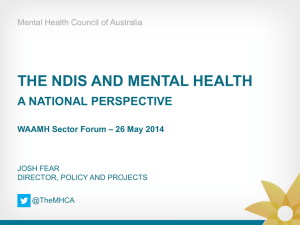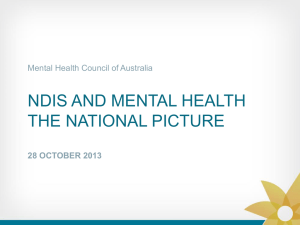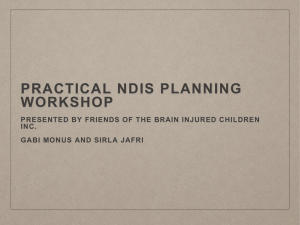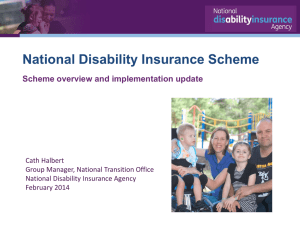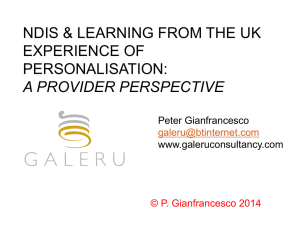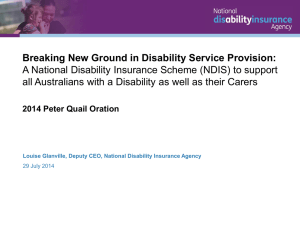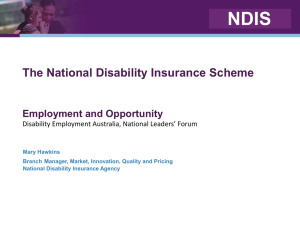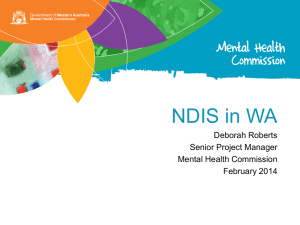Mental Health Council of Australia
advertisement
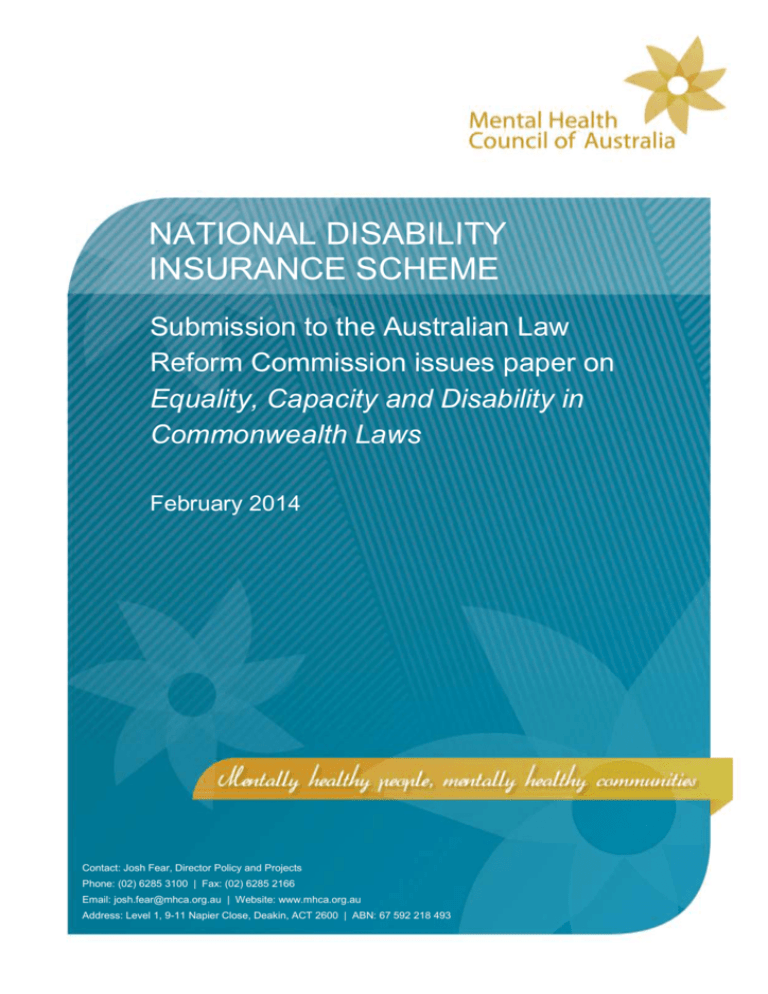
RECOMMENDATIONS NATIONAL DISABILITY INSURANCE SCHEME Submission to the Australian Law Reform Commission issues paper on Equality, Capacity and Disability in Commonwealth Laws February 2014 Contact: Josh Fear, Director Policy and Projects Phone: (02) 6285 3100 | Fax: (02) 6285 2166 Email: josh.fear@mhca.org.au | Website: www.mhca.org.au Address: Level 1, 9-11 Napier Close, Deakin, ACT 2600 | ABN: 67 592 218 493 Mental Health Council of Australia | Submission to the Australian Law Reform Commission issues paper - February 2014 1 1. INTRODUCTION The Mental Health Council of Australia (MHCA) welcomes the opportunity to provide feedback on the National Disability Insurance Scheme (NDIS) in response to Question 12 of the Australian Law Reform Commission (ALRC) issues paper, Equality, Capacity and Disability in Commonwealth Laws. The central principles of the NDIS of choice and control go to the heart of this inquiry, particularly with respect to maximising the capacity of people with disability to make decisions that are in their own best interests. Accordingly, in addition to Question 12, this submission touches upon other questions posed in the ALRC Issues Paper, including supported decision-making (Question 1), defining and assessing mental capacity (Question 4), and the role of carers and families (Question 5). For further detail on these specific issues, please refer to the joint submission to this inquiry made by the MHCA with the National Mental Health Consumer and Carer Forum (NMHCCF). The issues outlined below may have implications for the current drafting and/or implementation of the National Disability Insurance Scheme Act 2013 (Cth) (the NDIS Act) and associated NDIS Rules, as well as the operations and powers of the National Disability Insurance Agency (NDIA). The MHCA will continue to advocate on policy and implementation issues as the NDIS is rolled out over the next few years. 2. SUMMARY OF RECOMMENDATIONS In this submission, the MHCA makes the following recommendations: SCHEME DESIGN That the Australian Government resolve the contradiction between recovery-oriented practice and the permanency requirement specified in the NDIS legislation by changes to the NDIS Act, NDIS Rules and/or participant plans. That the NDIS Act and the NDIS Rules for Participants be amended, and associated administrative arrangements better articulated, in order to reflect the fluctuating and episodic nature of psychosocial disability. That Commonwealth and State/Territory Governments commit to maintaining or increasing funding and levels of service for current and future consumers of mental health services, regardless of whether those consumers are deemed eligible for the NDIS or are currently accessing mental health services. SERVICE QUALITY AND SAFEGUARDS That a quality framework for disability service providers under the NDIS be established as soon as possible, and/or a formal arrangement be established to ensure existing state and territory-based quality safeguards and protections apply to services delivered under the NDIS. That the NDIA determine the extent of risk presented by the current lack of a service quality framework. Mental Health Council of Australia | Submission to the Australian Law Reform Commission issues paper - February 2014 2 That the NDIA ensure that the National Mental Health Standards inform ongoing implementation of the NDIS. That the NDIA establish a formal process for tracking participants’ outcomes and related complaints. That the NDIA put in place mechanisms to review the effectiveness of the services provided by the NDIA to people with psychosocial disability, with these mechanisms harnessing consumer and carer expertise. SUPPORTED DECISION-MAKING That the NDIA set up arrangements to facilitate supported decision-making and provide support networks. That the NDIA ensure service providers use best practice supported decision-making, such as through a nationally agreed supported decision-making protocol that is explicitly incorporated into the NDIS Act and/or NDIS Rules. That the NDIA support the building of consumer and carer capacity to participate in decision-making at the individual and community levels. That the NDIA consider other systemic changes that would better enable consumers and carers to participate effectively in decisions about their lives. That the NDIS Rules be clearer that ‘multiple respondent assessments’ be used where possible to improve the accuracy of assessments. That the NDIA engage with hard-to-reach population groups though the use of assertive outreach approaches, ‘place based services’ and partnerships with service providers. 3. THE NDIS AND PSYCHOSOCIAL DISABILITY The NDIS represents an historic opportunity to deliver much-needed services and support for people with a range of disabilities, including people with a psychosocial disability related to mental illness. The MHCA is concerned that the NDIS may not meet the support needs of many people with severe mental illness. We therefore have strong reservations about the extent to which the NDIS will provide equal recognition for people with psychosocial disability and their carers compared with other kinds of disability. Such inequities could arise in relation to: lack of safeguards around NDIS processes, poor service quality and lack of protection from exploitation; supported decision making; eligibility requirements, including permanency of impairment, and other assessment issues; access requests and outreach; and system-wide implications, including for services delivered outside of the NDIS. Mental Health Council of Australia | Submission to the Australian Law Reform Commission issues paper - February 2014 3 Each of these issues is canvassed in further detail in this submission. There are around 489,000 people with serious mental illness in Australia1. The Productivity Commission estimated that 60,000 would qualify for an individualised package of support (‘Tier 3’) under the NDIS because they have a serious and persistent mental illness with complex interagency needs (as shown in Figure 1, below). Among this group, just 6,000 people with psychosocial disability associated with mental illness (that is, only 10 per cent of people with serious and persistent with complex interagency needs) were said to require the most intensive support. The MHCA believes that these figures lack credibility and vastly underestimate the level of need in the community. In deriving these numbers, the Commission acknowledged major limitations in the available data and the need for further analysis of the target population. Until the National Mental Health Service Planning Framework is finalised, these still appear to be the only estimates available to the NDIA.2 Figure 1: Estimated numbers of people with serious mental illness who will be eligible for an individualised package of support While not all 489,000 people with serious mental illness will require individualised support, there are likely to be many more than 60,000 people with mental illness who have significant disabilities warranting long-term support. Many of the issues that the mental health sector now faces have arisen from the eleventh-hour recognition by governments that people with psychosocial disability should be included in the NDIS. This meant that there was little or no consultation with consumers, carers and nongovernment service providers about how to properly cater for the needs of this important and vulnerable population group. The MHCA is seeking a guarantee from governments that existing and future mental health consumers and carers will not miss out on services or be left worse-off when the scheme is fully implemented. 1 Population estimates are drawn from the National Mental Health Service Planning Framework (currently in development). 2 See Productivity Commission 2011, Disability Care and Support, Report no. 54, Canberra, Appendix M. Mental Health Council of Australia | Submission to the Australian Law Reform Commission issues paper - February 2014 4 4. SAFEGUARDS The MHCA is concerned that the NDIA does not yet have in place adequate safeguards to ensure that people with psychosocial disability can be assured of quality services from the NDIS during the launch phase. This is particularly in relation to ensuring that: NDIA processes are accessible, fair and effective; that NDIA personnel have the appropriate skills and tools to work with people with psychosocial disability; and a minimum standard of service quality from registered providers is assured. The MHCA is aware that an evaluation of the NDIS launch sites is being undertaken by Flinders University and that evaluators will be consulting with stakeholders to inform this in due course. However details of the evaluation are not yet available and there are currently no clear mechanisms for monitoring and addressing critical issues as they arise. Appropriate mechanisms need to be in place now so that interaction with NDIS does not cause undue harm or concern to participants. The impact of barriers relating specifically to equity of assessment, eligibility and accessibility of NDIS services are highlighted in more detail under Sections 6 and 7, below. The following mechanisms are also proposed to ensure that the NDIS has adequate safeguards during the launch phase. NATIONAL MENTAL HEALTH STANDARDS It is clear that the NDIS guidelines aim to support the National Disability Standards. However, for people with psychosocial disability, services also need to have regard to the National Mental Health Standards and the principles which underpin them. The National Mental Health Standards provide a benchmark for effective services for people with mental illness, and have been endorsed by Commonwealth and State/Territory Governments. The Standards emphasise the notion of recovery for people with mental illness, along with the importance of consumer and carer engagement in planning and delivering services. The MHCA recommends that the NDIA ensure that the National Mental Health Standards inform ongoing implementation of the NDIS. NDIA PROCESSES The MHCA is concerned that the NDIA does not have in place appropriate processes for ongoing monitoring of barriers to meeting the needs of participants and ways to address these. For example, the MHCA regularly receives feedback from launch sites that some assessors and planners who do not understand the needs of people with psychosocial disability are not able to appropriately identify support needs or recommend appropriate support mechanisms for NDIS participants. Some support plans have been developed without taking account of vital information from consumers’ support networks such as carers, with whom they live, or service providers, with whom they may spend much of their time. Mental Health Council of Australia | Submission to the Australian Law Reform Commission issues paper - February 2014 5 There is also no mechanism currently in place to track outcomes of NDIS participants, meaning there is little accountability for the effectiveness or otherwise of arrangements administered by the NDIA. While this may seem a minor teething problem in the administration of a complex scheme, the current lack of transparent accountability mechanisms could have major impacts on the lives of individual mental health consumers and carers whose needs are not adequately met. Such impacts might include the exacerbation of symptoms or people walking away from the process to avoid any deterioration in their condition. This is a particular concern for people who may slip undetected through gaps in the system, who are not good at advocating for themselves or who do not have anyone to advocate for them. Although service providers and families are able to approach the agency with specific problems, the MHCA recommends the NDIA establish a formal, transparent and systematic process for tracking participants’ outcomes and related complaints. It should also be noted that funding for individual advocacy services is likely to be transferred to the NDIS, meaning that many individual advocacy services will no longer exist to provide this support. In addition to outcomes tracking, participants should be confident that planners and assessors have the skills and the NDIA has the appropriate processes in place to ensure that assessment, planning and other processes meet their needs. The MHCA recommends that mechanisms should be in place now for NDIA to review the effectiveness of the services that it provides to people with psychosocial disability to ensure that they are person-centred and that adverse outcomes do not arise from interactions with the NDIA. Consistent with the National Mental Health Standards, consumer and carer expertise should be harnessed to guide monitoring and review at both the individual and systemic levels. SAFEGUARDS AND QUALITY OF SERVICE PROVISION As the NDIS rolls out, there will be a need to ensure close monitoring of the quality of services delivered by registered providers and practitioners delivering support to people with psychosocial disability. The MHCA is aware that a quality framework for disability service providers is yet to be developed under the NDIS. Until such time as a quality framework is implemented, governments appear to be relying on market forces to ensure that services are of a high quality. In other words, it is assumed that consumers and carers will regulate the quality of services by choosing or rejecting one service offering or another. While the MHCA recognises that market forces could eventually drive improvements to service quality and availability, it is questionable how powerful these forces will be when consumers are often poorly equipped to evaluate the options available to them. As outlined in more detail below, a lack of decision-making support for people with psychosocial disability will be a key barrier to consumers and carers exercising choice and control over the services they receive in ways which reflect their own best interests. Further, in light of a lack of a quality framework for NDIS services, it is unclear how state/territoryadministered safeguards for people with psychosocial disability will apply to services provided under the NDIS. For example, in the Australian Capital Territory (ACT), the NDIS Taskforce has identified that contracting with service providers is a key mechanism for ensuring quality in services under block funding arrangements. Once block funding arrangements no longer exist, these state-based mechanisms to manage quality will no longer be available, and no apparent alternative mechanism Mental Health Council of Australia | Submission to the Australian Law Reform Commission issues paper - February 2014 6 in place. This situation – which the MHCA understands applies in various jurisdictions – creates serious systemic risks for people accessing disability services under the NDIS. The MHCA therefore recommends that: a quality framework for disability service providers under the NDIS be established as soon as possible, and/or a formal arrangement be established to ensure the applicability of existing state-based quality safeguards and protections to services delivered under the NDIS. the NDIA determine the extent of risk presented by the current lack of a service quality framework. 5. A NATIONAL SUPPORTED DECISION-MAKING FRAMEWORK To be consistent with the United Nations Convention on Rights of Persons with a Disability, Australia requires a much more robust framework for supported decision-making in the disability and mental health sectors. The fundamental principle of choice and control underlying the NIDS reinforces the importance of maximising the capacity of individuals to make effective and informed choices. Australia’s poor performance in this area is evident in the Australian Government’s Initial Report under the Convention on Rights of Persons with Disabilities in relation to Article 12 (Equal recognition before the law). The report largely describes Australia’s framework for substituted decision-making, which should in fact be a last resort after opportunities for supported decision-making have been exhausted.3 Under the NDIS, people with psychosocial disability and their carers will need to be better equipped to make choices which reflect their best interests and life aspirations. However, there appear to be few incentives or formal processes for supporting decision-making under NDIS funding arrangements. Further, little thinking appears to have taken place in the NDIA about the specific barriers that people with psychosocial disability face in exercising choice and control, such as difficulties with cognition, communication and self-advocating, or the fact that many people with serious mental illness are estranged from family and other support networks. Since the ratification of the United Nations Convention on Rights of Persons with a Disability, the disability sector has proposed that a framework of measures to support decision-making include: administrative mechanisms or processes at the system or service levels to ensure that services are able to effectively support decision-making. These could include, for example, funding for the provision of independent advocates, or personal ombudsmen and ensuring that NDIA processes include provision for effective decision-making supports; and Australian Government, Attorney General’s Department, Australia’s Initial Report under the Convention on Rights of Persons with Disabilities, accessed from the Australian Government Attorney General’s Department Website on 21 Jan 2014: http://www.ag.gov.au/RightsAndProtections/HumanRights/ReportCRPD/Pages/Equalrecognitionbeforethela warticle12.aspx 3 Mental Health Council of Australia | Submission to the Australian Law Reform Commission issues paper - February 2014 7 capacity building measures, programs or processes at the individual or community levels to empower consumers and communities to actively participate in supported decision-making. These could include programs to educate consumers and carers about the NDIS.4,5 The MHCA therefore recommends that supporting decision-making by potential NDIS participants with psychosocial disability be a greater priority for the NDIA, with a focus on: 6. setting up administrative frameworks (which may involve amendments to the NDIS Act and/or NDIS Rules) within the NDIA and the NDIS to facilitate supported decisionmaking and provide support networks, including independent advocates; ensuring that service providers use best practice supported decision-making, such as through a nationally agreed supported decision-making protocol linked to the NDIS; building consumer and carer capacity at individual and community levels to participate in decision-making; and identifying and implementing systemic changes that enable consumers and carers to participate effectively in decisions about their lives. ASSESSMENT AND ELIGIBILITY Accurate and comprehensive assessments of functioning and support needs are essential to securing equal recognition of, and distribution of resources for, people with psychosocial disability accessing the NDIS. There are four main areas of concern relating to assessment for the NDIS that the MHCA seeks to highlight: a) the permanency requirement and the conflict with ‘recovery’; b) the limitations of the ‘point in time’ assessment process; c) the lack of clarity around the contribution that carers and supporters can make to assessments; and d) the appropriateness of tools used to assess functional impairment and support needs. (A) THE ‘PERMANENCY’ REQUIREMENT In order to qualify for Tier 3, the NDIS Act requires a person to demonstrate that their impairment(s) are, or are likely to be, permanent6. While permanency may be a meaningful concept for some kinds of disability, in the context of mental illness it is less clear. Most people with psychosocial disability have needs (or impairments) 4 French, P, (2009), Everyone, Everywhere: Recognition of Persons with Disability as Persons before the Law, People with Disability Australia, Sydney. 5 People with Disability, 2012, Disability Rights Now – Civil society report to the United Nations Committee on the Rights of Persons with Disabilities. People with Disability Australia. 6 Sub-sections 24(1)(a)-(e) Mental Health Council of Australia | Submission to the Australian Law Reform Commission issues paper - February 2014 8 that fluctuate in severity and in nature over their lifetimes, and it is often difficult or impossible to predict who will need long-term support and who will exit the ‘system’. This aspect of psychosocial disability is not adequately recognised by the scheme’s current conceptualisation of ‘permanency’. As a result, despite having ongoing, long-term support needs arising from psychosocial disability, many people with severe and persistent mental illness will not be deemed to have a sufficiently serious impairment that qualifies them for Tier 3 support. It is unlikely that the permanency principle currently embedded in the scheme can be reconciled with these realities. While there is at this stage no publicly available data that might shed light on how the permanency requirement is being interpreted in practice, anecdotal evidence already suggests that medical practitioners are reluctant to brand someone with mental illness as being ‘permanently disabled’ because of the stigma and shame that such a label can carry. Unless this issue is addressed at the earliest possible opportunity, significant numbers of people with psychosocial disability with high and ongoing support needs will be denied access to the NDIS. The MHCA believes that this is not consistent with Australia’s obligations under the United Nations Convention on Rights of Persons with a Disability, and could be interpreted as discrimination on the grounds of disability type. People with experience of mental illness/psychosocial disability, and the mental health services that support them, have for many years now adopted the principle of ‘recovery’ as paramount to the therapeutic process. Recovery from mental illness may mean different things to different people but could be summarised as the process of working towards living a contributing life to the fullest extent possible. Recovery principles are entirely consistent with the overarching objectives of the NDIS to maximise individual choice and control over decision making and economic and social participation. Unfortunately, the requirement to demonstrate that an impairment is permanent contradicts the principles that underpin recovery-oriented practice, and may deter people with psychosocial disability from accessing the scheme in the first place. The NDIA must have regard for the application of recovery-oriented approaches and terminology in its assessment and planning processes. This could be achieved at an agency/service level by developing operational guidelines for assessors and planners working with people with psychosocial disability. The MHCA therefore recommends that the fundamental contradiction between recoveryoriented practice and the permanency requirement specified in the NDIS legislation be resolved by changing the wording of the NDIS Act and the NDIS Rules for Participants, or at the assessment level where participant plans could be written up as ‘recovery plans’ for people with psychosocial disability. (B) POINT-IN-TIME ASSESSMENT Psychosocial disability is often episodic in nature and can result in fluctuating levels of need, not only over a lifetime but over the course of weeks and months. This has implications for the accuracy of the ‘point in time’ needs assessment process currently in place for the NDIS. One person’s needs may not be immediately obvious at the time of assessment, but nevertheless be ongoing, while another’s acute needs may be quite apparent but not lasting. The MHCA recommends that the NDIS Act and the NDIS Rules for Participants be amended, and associated administrative arrangements better articulated, to ensure that assessment processes reflect the fluctuating and episodic nature of psychosocial disability. Mental Health Council of Australia | Submission to the Australian Law Reform Commission issues paper - February 2014 9 (C) THE ROLE OF FAMILIES, CARERS AND SUPPORT PEOPLE IN THE ASSESSMENT PROCESS The ability of NDIA assessors to get an accurate picture of a person’s level of functioning depends in part on the people who contribute information and insights in the assessment process. An assessment that relies largely on medical records and self-reporting of a person’s perceived abilities and needs may not deliver an accurate picture of that person’s situation. In order to make a comprehensive assessment of a person’s functional capacity and support needs, the assessment process must involve families, carers and/or other support people to the fullest extent possible. Often families, carers and support people will have a good understanding of support needs over time and the impact of a person’s psychosocial disability on their social functioning. Support people can include service providers where there is a wellestablished and trusting relationship between the service provider and a person with disability. The extent to which the views of families, carers and supporters will be taken into account when balanced against the principle of individual choice and control is unclear. The rules only state that the perspectives of families and carers may be taken into account. The MHCA recommends that, at a minimum, the Rules be clearer that ‘multiple respondent assessments’ be used where possible to improve the accuracy of assessments, by bringing to light important additional information from carers, family members and supporters, as well as from clinical and community mental health workers who have worked with the person seeking access to NDIS support. (D) CERTAINTY AROUND APPROPRIATENESS OF ASSESSMENT TOOLS Assessments that misrepresent the true support needs of people with psychosocial disability risk embedding an inequitable approach to the distribution of resources for supports in the NDIS more broadly. This is why it is critical to ensure that the tools being used to assess NDIS eligibility accurately and comprehensively measure functional capacity and support needs as they relate to the disability in question. The MHCA has requested access to the assessment tool being used to screen people with psychosocial disability on a number of occasions without success. However, on the basis of available information, the MHCA is concerned that the tool being used to assess psychosocial disability has not been specifically tailored for this purpose, but rather has been adapted from a tool designed for intellectual disability without due consideration to its applicability for people with psychosocial disability. If these concerns are borne out, it is likely that the tool will limit access to the NDIS for people with psychosocial disability who should in principle be eligible for Tier 3 support. Such an outcome would appear to be in breach of sections 4.5 and 4.6 of the NDIS (Supports for Participants) Rules 2013, which state that while assessment tools may be specifically tailored to particular impairments, they must ensure fair and transparent assessment reasonable and necessary supports. The MHCA recommends that the NDIA release details of the assessment tool being used to screen people with psychosocial disability for eligibility for individually funded support packages through the NDIS, and/or consult closely with non-government stakeholders with expertise in assessing psychosocial disability impairments and support needs regarding the tool’s suitability. Mental Health Council of Australia | Submission to the Australian Law Reform Commission issues paper - February 2014 10 7. ACCESS There are a number of conventional avenues through which people can seek to access the NDIS. These include direct access in person via the established NDIA shopfronts in the trial sites, by phone, or through current service providers delivering support through programmes that are ‘in-scope’ for the NDIS. The Act states that to receive assistance through the NDIS, prospective participants must first make an access request to participate in the scheme7. This ‘opt-in’ approach is consistent with the overarching objectives of the scheme – namely, to enable people with disabilities to exercise maximum choice and control over their lives and the supports they receive to facilitate independent living and participation. However, there are a number of people who may be eligible to receive NDIS support but who may not seek to access the scheme via these avenues. Rather, some people may not be in a position to make an access request for support through the NDIS precisely because of the severity of their disability or their living circumstances. Of particular concern to the mental health sector are people who have limited insight into their illness or disability. Such people may in fact have higher support needs than other people with psychosocial disability but may not receive support through the NDIS because they perceive that they have no need for it. Another high-needs group is people with severe and persistent mental illness/psychosocial disability who experience homelessness. Research indicates that people with mental illness are overrepresented amongst the homeless population (boarding houses, homelessness services and people sleeping rough) and in insecure accommodation such as long-stay caravan parks and public housing8. People experiencing homelessness face a raft of barriers to accessing services due to both their living situation and the nature of their disability. While some people within this group may be connected to health and social services, a significant proportion may be disengaged from the service system and, in some cases, openly distrustful of mainstream services and ‘helping professionals’. Further, those who are estranged from or are living without the support of family or 7 Sub-sections 18 (1) AIHW 2013. Housing assistance in Australia 2013. Cat. no. HOU 271. Canberra: AIHW; accessed online at http://www.aihw.gov.au/publication-detail/?id=60129545054; Buhrich N; Hodder T; Teesson M, 2003, Down and out in Sydney (V0l.2) Caring for homeless people who have a mental disorder, Research Group in Mental Health and Homelessness, Sydney, accessed online at http://ndarc.med.unsw.edu.au/publication/down-and-out-sydney-v0l2-caring-homeless-people-who-havemental-disorder; Buhrich N; Hodder T; Teesson M, 2003, Down and out in Sydney (V0l.2) Caring for homeless people who have a mental disorder, Research Group in Mental Health and Homelessness, Sydney, accessed online at http://ndarc.med.unsw.edu.au/publication/down-and-out-sydney-v0l2-caringhomeless-people-who-have-mental-disorder; Anderson, Peter, Arthur Hume, Nancy Rogers & Tracey Stephenson (2003), It’s No Palace: Boarding Houses: the sector, its clientele and its future, SA Department of Human Services, accessed online at: http://www.socialinclusion.sa.gov.au/files/Homelessness_ItsNoPalace.pdf; Barbour, Bruce & NSW Ombudsman (2011). More than board and lodging: the need for boarding house reform : a special report to Parliament under section 31 of the Ombudsman Act 1974. Sydney, NSW: NSW Ombudsman, accessed online at http://www.ombo.nsw.gov.au/__data/assets/pdf_file/0016/3346/SR-Boarding-Houses.pdf; Baptist Community Services Lifecare & University of Wollongong (2011) Needs of Residents in Unlicensed Boarding Houses, University of Wollongong, accessed online at: http://www.bcs.org.au/site/DefaultSite/filesystem/documents/About%20BCS/Research/BCS%20Boarding%2 0House%20Research%20Full%20Report.pdf;; 8 Mental Health Council of Australia | Submission to the Australian Law Reform Commission issues paper - February 2014 11 a close circle of friends are probably least likely to make an access request for supports through the NDIS. It is precisely these types of people that could stand to benefit the most from the individualised and person-centred approach that underpins the NDIS. It is therefore imperative that mechanisms are in place to ensure the NDIA can identify and proactively engage with people currently not accessing services and who are marginalised from mainstream systems, but who may be eligible for the NDIS. The MHCA recommends the NDIA effect this engagement though the use of assertive outreach approaches, ‘place based services’ and partnerships with service providers, including specialist homelessness services and assertive community treatment. This is in line with the Productivity Commission’s Report on the Inquiry into Disability Care and Support, which stated: “…While an important goal of the NDIS will be to assist people with disability to access suitable and secure housing, outreach services will still be required. The Commission considers that the NDIS should provide homeless outreach services and work collaboratively with not-for-profits (such as Matthew Talbot Homeless Services) and other government agencies, including Centrelink, to connect people to a broader range of services…”9 Assertive outreach (assertive community treatment to promote recovery in the case of people with severe and persistent mental illness) differs from passive outreach models in that its aim is to actively engage with a person, establish a therapeutic relationship and engage in service delivery ‘in place’10. The effectiveness of such approaches to has been demonstrated by recent initiatives to address homelessness, showing that good outcomes can be achieved by working in partnership with people with a history of disengagement and marginalisation. Mainstream agencies such as the Commonwealth Department of Human Services are also embracing the concept of ‘place based services’, in recognition that for some people the old adage of ‘build it and they will come’ does not hold true. It is vital that the NDIA embraces assertive outreach for people with severe and persistent mental illness/psychosocial disability who are cycling through boarding houses, crisis services, rough sleeping, hospital and back to boarding houses, and who may meet eligibility criteria for Tier 3 supports through the NDIS, to ensure that as many as possible are given fair opportunity to gain access to the scheme. One of the strengths of the NDIS is the commitment on the part of the NDIA (through its board) to engage proactively with other service systems. With this in mind it is vital that the NDIA provide for Local Area Coordinators and assessors to engage proactively with community services, particularly those in the mental health, homelessness and social housing sectors. This engagement will help ensure that people who may be eligible for the NDIS and who are experiencing homelessness or marginal tenure, or who are otherwise unlikely to make an access request, are not unintentionally excluded from accessing the scheme. 9 Productivity Commission, Report on the Inquiry into the Provision of Disability Care and Support, Australian Government, 2011, Canberra, p.233. (emphasis added) 10 National Alliance on Mental Illness (2007) Fact Sheet: Assertive Community Treatment: Investment Yields Outcomes, accessed online at http://www.nami.org/Template.cfm?Section=actta_center&template=/ContentManagement/ContentDisplay.cfm&ContentID=52382 Mental Health Council of Australia | Submission to the Australian Law Reform Commission issues paper - February 2014 12 8. SERVICE AVAILABILITY OUTSIDE THE NDIS A number of Commonwealth and State/Territory-funded mental health programmes are fully or partially ‘in-scope’ for the NDIS. The MHCA understands that the NDIS will be partly resourced by redirecting funding for these programmes and/or by restricting their application in favour of Tier 3 NDIS participants with severe and persistent mental illness. There are a number of equity concerns if these decisions are implemented nationally. There is no guarantee that mental health funding redirected into the NDIS will be spent on supports for participants with mental illness. There may be large numbers of people with psychosocial disability who are eligible for the NDIS, but who do not gain access to mental health services through a NDIS support package (due to issues associated with access and assessments, as outlined above). There will be fewer services available to people with mental illness who are not eligible for a Tier 3 support package, but who nevertheless require support to help manage their symptoms and prevent any deterioration of their mental health condition. Governments have so far guaranteed that people currently receiving support through ‘in-scope’ programmes can continue to do so even if they do not meet eligibility criteria for Tier 3 supports under the NDIS. While this is welcomed, it does not address concerns about the need for future clients of these programmes who are not eligible for the NDIS to continue to have access to these vital programmes when the NDIS is fully operational. If someone with a serious mental illness does not qualify for an individualised package of support – and the MHCA anticipates that there will be many people who fit this description under current eligibility requirements – it is not at all clear how the NDIS will benefit them. On the contrary, current indications are that Tier 2 participants will need to rely on existing systems of referral and support, the very systems that are responsible for far too many people already ‘falling through the cracks’ and not getting the assistance they need on their recovery journey. If such a scenario unfolds, it would have negative impacts on other systems beyond the NDIS, for example by increasing crisis-driven and hospital-centric approaches to mental illness. This would be a strange, and very unfortunate, consequence of a major reform which is intended to substantially increase the services available for people with disabilities. The MHCA therefore urges governments to commit to maintaining or increasing funding and levels of service for current and future consumers of mental health services, regardless of whether those consumers are deemed eligible for the NDIS or are currently accessing mental health services. 9. ABOUT THE MHCA The MHCA is the peak, national non-government organisation representing and promoting the interests of the Australian mental health sector and committed to achieving better mental health for all Australians. It was established in 1997 as the first independent peak body in Australia to truly represent the full spectrum of mental health stakeholders and issues. MHCA members include national organisations representing consumers, carers, special needs groups, clinical service providers, public and private mental health service providers, researchers and state/territory community mental health peak bodies. Mental Health Council of Australia | Submission to the Australian Law Reform Commission issues paper - February 2014 13 The MHCA aims to promote mentally healthy communities, educate Australians on mental health issues, influence mental health reform so that government policies address all contemporary mental health issues, conduct research on mental health issues, and carry out regular consultation to represent the best interests of our members, partners and the community. These endeavours in education and policy reform are matched by our commitment to researching more innovative approaches to the provision of mental health care. In addition, the MHCA continues to focus on the human rights of people with a mental illness. Mental Health Council of Australia | Submission to the Australian Law Reform Commission issues paper - February 2014 14 Mental Health Council of Australia | Submission to the Australian Law Reform Commission issues paper - February 2014 15
